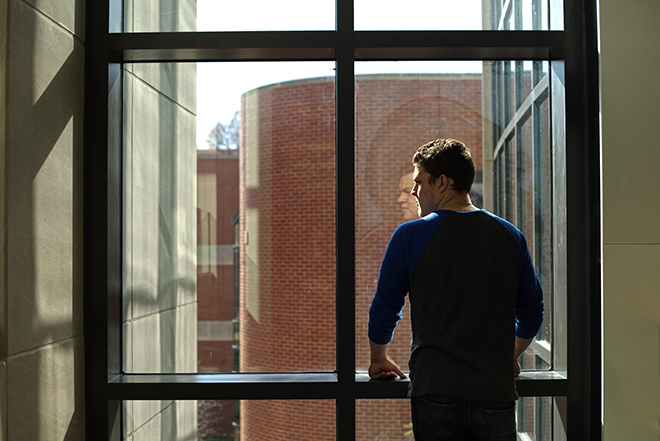Would it be easier for everyone if I died? Why am I still alive? For some college students, these thoughts become an everyday scenario.
Starting my freshman year of high school, I was one of those students.
I was always smaller than the other kids growing up, which made me the target of bullying. On top of that, I fought with my family during my eighth-grade year.
The bullying and constant fighting took its toll on my mental state and led to depression. The depression continued to get worse every day as the fighting with my family never ceased.
It had gotten to the point where I started questioning why I was still alive. I started telling myself that nobody loved me or even wanted me to be around. I considered taking my own life to end what I thought was other people’s suffering.
According to the Centers for Disease Control and Prevention, suicide is the second leading cause of death for people ages 15 – 24. Among that age group, there are 1,100 college students who die by suicide each year, equivalent to three a day according to the American Association of Suicidology.
An anonymous web-based survey created by a group of psychology professors at the University of Texas-Austin was distributed to over 26,000 undergraduate and graduate students at 70 colleges and universities. According to the results, 18 percent of undergraduate students have seriously considered death by suicide, and 40 percent to 50 percent of the same group of students reported having multiple episodes of suicidal ideation.

Suicidal thoughts are usually caused by a culmination of factors that create a sense of hopelessness, feeling of being trapped and a sense of being a burden on others, according to Dr. Khanh Nghiem, an advisor and counseling center therapist for Ball State’s Suicide Prevention Outreach Team.
My thoughts were caused by a culmination of the bullying and constant arguing. I never told anyone what was running through my mind, until one specific fight with my family.
We had gone camping for the weekend. We arrived at our camper and unpacked when my brothers tried to take the bed I had always slept in. This upset me, so my brothers and I started fighting. When they refused to get out of my bed, I pushed my brother off, causing him to hit his head.
Hearing the commotion, my parents came into the camper to find out what had happened.
While my parents were yelling at me, my brothers started to tell me they hated me. It didn’t get quiet in the camper until I screamed, if they would like for me to kill myself. If they would all be happy when I was gone.
My parents then came to the realization that I meant what I said.
Everything changed after this exchange. My parents stopped leaving me home alone. They locked up all the guns and knives in the house, and wanted someone to keep an eye on me at all times.
But the thoughts never stopped.
I never told anyone besides my parents what was going on. One person who did pick up on my actions and attitude, and knew what was happening with me, was Sharon Lucero, my high school journalism adviser. I had Lucero as a teacher for one of my eighth-grade classes, and she noticed a change in my mentality as I started my freshman year.
“I knew he was depressed because he hesitated when he talked or asked questions, but I didn’t know he was suicidal at the time,” Lucero said. “He was shy and he would let other people speak until they weren’t around, and then he would talk to me about something he thought was a great idea.”
She invited me to join her journalism program, where I became a photographer my freshman year, teaching me all she knew. The depression faded away when I started to focus more on my photos and work on the high school yearbook.
There is a stigma surrounding the topic that suicide is a subject that shouldn’t be talked about, especially if someone is feeling sad or depressed. Dr. Nghiem said this is a stigma that needs to be stopped.
“People feel like if they ask somebody about suicide or about their suicidal thoughts, they are actually implanting the idea or suggesting it to the person,” Dr. Nghiem said. “And that’s not the case at all.”
I never understood why Lucero took an interest in me until this past year when we met to talk about what has happened since I graduated high school. But by taking an interest and caring about me, she showed me that I do have people that love me. She taught me that I have a good life and it would be a waste to throw it away.
“The biggest thing that helped Rick was constantly pushing him to do better and better, and forcing him to make decisions in life to become what he wanted to become,” Lucero said. “If he would have [died by] suicide, I would have taken that pretty hard, it would have been devastating to [the journalism department] and the staff.”
If a person is feeling suicidal, asking them questions or convincing them to seek help is could be beneficial. It lets him or her know that they don’t have to be alone.
“It’s like people always say: A child can bury a parent, but to bury a child leaves a different feeling because they haven’t lived their life,” Lucero said.
Lucero has always told her students, “Just because you fail once, it doesn’t mean you failed at life. You need to keep failing so you can keep doing more things. Success will be there eventually.”
Dr. Nghiem told her clients that they shouldn’t want to leave someone with these tendencies alone. When teaching someone new about suicide, she always asks one question, “If you saw someone bleeding or drowning, what would you do?” The response is always the same: Help them.




